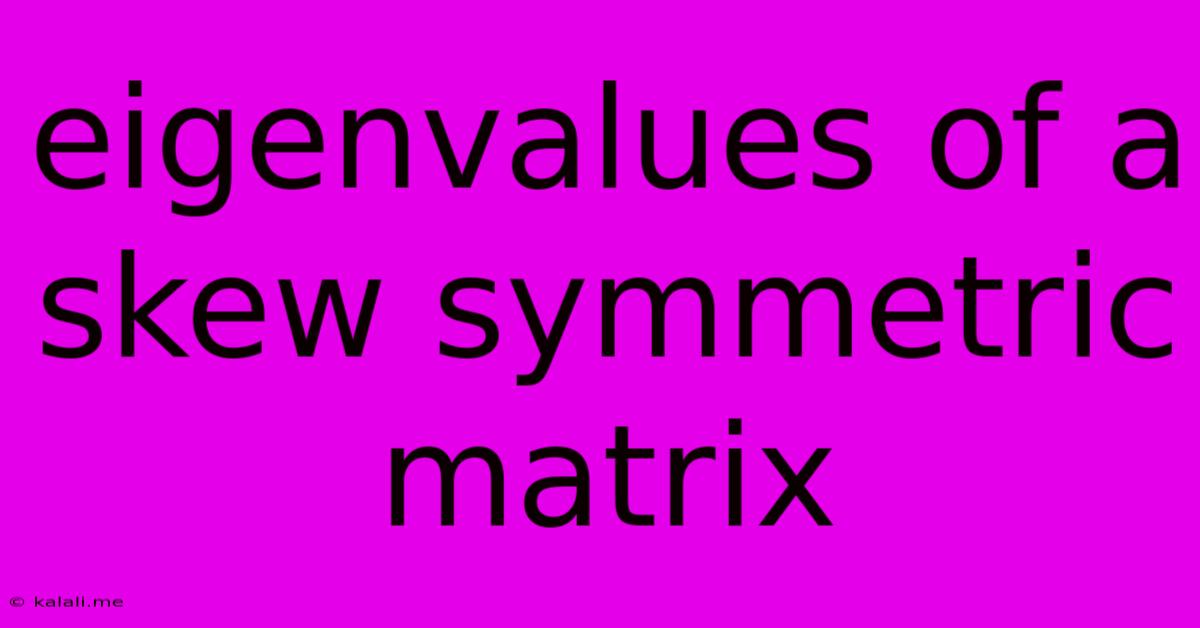Eigenvalues Of A Skew Symmetric Matrix
Kalali
Jun 04, 2025 · 3 min read

Table of Contents
Eigenvalues of a Skew-Symmetric Matrix: A Comprehensive Guide
Meta Description: Uncover the fascinating properties of eigenvalues associated with skew-symmetric matrices. This guide delves into their characteristics, proofs, and applications, providing a comprehensive understanding for mathematicians and students alike. Learn about complex eigenvalues, purely imaginary values, and the implications for various fields.
Skew-symmetric matrices, defined by their transpose being equal to their negative (A<sup>T</sup> = -A), possess unique properties when it comes to their eigenvalues. Understanding these properties is crucial in various mathematical fields, including linear algebra, differential equations, and mechanics. This article will explore the characteristics of eigenvalues of skew-symmetric matrices, providing proofs and illustrative examples.
Defining Skew-Symmetric Matrices
A square matrix A is considered skew-symmetric if its transpose is equal to its negative. Mathematically, this is represented as:
A<sup>T</sup> = -A
This implies that the diagonal elements of a skew-symmetric matrix must be zero, as a<sub>ii</sub> = -a<sub>ii</sub> only holds true if a<sub>ii</sub> = 0.
Eigenvalues of Skew-Symmetric Matrices: The Key Property
The most significant characteristic of eigenvalues (λ) associated with skew-symmetric matrices is that they are either zero or purely imaginary. This means they are of the form λ = 0 or λ = bi, where 'b' is a real number and 'i' is the imaginary unit (√-1).
Proof: Demonstrating the Purely Imaginary or Zero Eigenvalue Property
Let's consider a skew-symmetric matrix A and an eigenvector x corresponding to an eigenvalue λ. By definition, we have:
Ax = λx
Now, let's take the conjugate transpose of this equation:
(Ax)<sup>H</sup> = (λx)<sup>H</sup>
Using properties of conjugate transpose, we get:
x<sup>H</sup>A<sup>H</sup> = λx<sup>H</sup> (where λ is the complex conjugate of λ)
Since A is skew-symmetric, A<sup>H</sup> = -A. Substituting this into the equation above:
x<sup>H</sup>(-A) = λ*x<sup>H</sup>
-x<sup>H</sup>A = λ*x<sup>H</sup>
Now, let's pre-multiply the original eigenvalue equation (Ax = λx) by x<sup>H</sup>:
x<sup>H</sup>Ax = x<sup>H</sup>λx = λx<sup>H</sup>x
Since x<sup>H</sup>x is a positive real number (the squared magnitude of the vector x), we can replace it with a positive real number, say ||x||<sup>2</sup>. So we have:
x<sup>H</sup>Ax = λ||x||<sup>2</sup>
Now, let's consider the conjugate transpose of x<sup>H</sup>Ax:
(x<sup>H</sup>Ax)<sup>H</sup> = (λ||x||<sup>2</sup>)<sup>H</sup> = λ*||x||<sup>2</sup>
Also, (x<sup>H</sup>Ax)<sup>H</sup> = x<sup>H</sup>A<sup>H</sup>x = -x<sup>H</sup>Ax. Substituting this:
-x<sup>H</sup>Ax = λ*||x||<sup>2</sup>
Therefore, we have:
λ||x||<sup>2</sup> = -λ*||x||<sup>2</sup>
Since ||x||<sup>2</sup> is non-zero, we can divide by it:
λ = -λ*
This equation holds true only if the real part of λ is zero, implying that λ is either zero or purely imaginary.
Implications and Applications
This unique property of eigenvalues has significant implications in various fields:
- Linear Transformations: Understanding the eigenvalues helps characterize the nature of linear transformations represented by skew-symmetric matrices.
- Stability Analysis: In dynamical systems, the eigenvalues of matrices play a crucial role in determining the stability of equilibrium points. The purely imaginary eigenvalues often indicate oscillatory behavior.
- Physics and Engineering: Skew-symmetric matrices appear frequently in the representation of rotations and angular momentum in physics and engineering applications.
Conclusion
The eigenvalues of skew-symmetric matrices are a fascinating topic with practical applications across diverse fields. Their restricted nature – purely imaginary or zero – provides crucial insights into the behavior of systems described by these matrices. This guide has aimed to provide a comprehensive understanding of these properties, supported by a rigorous proof, allowing for a deeper appreciation of their significance.
Latest Posts
Latest Posts
-
How Do You Attach A Dishwasher To Granite Countertop
Jun 05, 2025
-
Parts To Assemble A Leg To Chair
Jun 05, 2025
-
Google Apps Script Round To Nearest Number
Jun 05, 2025
-
Best Spring Break Locations In Us
Jun 05, 2025
-
When To Use Bell Trap Floor Drain
Jun 05, 2025
Related Post
Thank you for visiting our website which covers about Eigenvalues Of A Skew Symmetric Matrix . We hope the information provided has been useful to you. Feel free to contact us if you have any questions or need further assistance. See you next time and don't miss to bookmark.